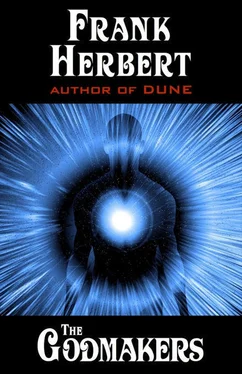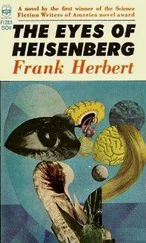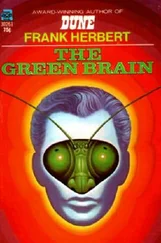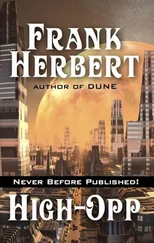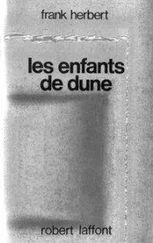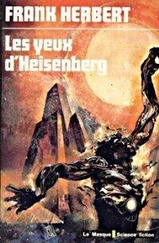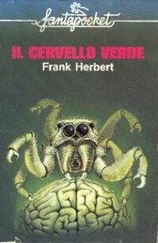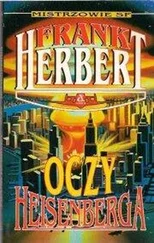“What need have I of guards?” the Abbod asked. “When a thing is guarded, that creates the need for guards.”
Again, the skeletal arm gestured toward the chair. “Please be seated. It disturbs me to see you so uncomfortable.”
Orne studied the chair. It was a spindly thing without arms to conceal secret bindings.
“It is just a chair,” the Abbod said.
Orne sat down like a man plunging into cold water, tensed his muscles to leap.
Nothing happened.
The Abbod smiled. “You see?”
Orne wet his lips with his tongue. The air in the room bothered him. It felt deficient to his lungs. Something extremely out of place here. It was not going as he had imagined, but as he reflected upon this, he couldn’t think how he had imagined this meeting. It just wasn’t right.
“You have had a very trying time,” the Abbod said. “It was necessary for the most part, but please share my fellow feeling. I well recall how it was for me.”
“Oh? Did you come here to find out some things, too?”
“In a sense,” the Abbod said. “In a very real sense.”
“Why’re you trying to destroy the I-A?” Orne blurted. “That’s what I want to find out.”
“A challenge does not necessarily imply the wish to destroy,” the Abbod said. “Have you deciphered the intent behind your ordeal? Do you know why you cooperated with us in this perilous testing?” The large eyes, brown and glossy, peered innocently at Orne.
“What else could I do?”
“Many things, as you’ve just demonstrated.”
“All right… I was curious.”
“About what specifically?”
Orne felt something quicken within him, lowered his eyes. As he reacted, Orne wondered at himself. What am I hiding?
The Abbod said: “Are you being honest with yourself?”
Orne swallowed. He felt like a small boy called to account by his schoolmaster. He said: “I try to be. I… believe I continued because I suspected you might be teaching me things about myself that… I didn’t already know.”
“Superb,” the Abbod breathed. “But you’re a product of the Marakian civilization which…”
“And the Nathian,” Orne interrupted.
“To be sure,” the Abbod said. “And this civilization boasts of many techniques for the human to know himself—reconditioning, sophisticated microsurgical resources, the enforced application of acultural toning. How could there be anything about yourself that you still needed to know?”
“I just… knew there was.”
“Why? How?”
“There’s always something more we need to know about anything. That’s the way it is in an infinite universe.”
“A rare insight,” the Abbod said. “Have you ever been afraid without knowing precisely why?”
“Who hasn’t?”
“Indeed,” the Abbod agreed. “You speak the words, but I do not believe you act upon your insight. Ahhhh, if we only had the time to enroll you in the study of thaumaturgical psychiatry and the ancient Christians.”
“Enroll me in what?”
“There were mental sciences long before the techniques developed by your civilization,” the Abbod said. “The Christeros religion preserves many fragments of such techniques. You would find such study valuable.”
Orne shook his head. This wasn’t going the way it should. He felt defensive, outmaneuvered. Yet, all he faced was one skinny human in a ridiculous nightshirt.
No…
Orne corrected himself. He faced much more than that. The sense of power here could not be ignored.
The Abbod said: “Do you really believe you came here to protect your precious I-A, to discover if we were fomenting war?”
“That has to be part of the reason,” Orne said.
“And what if you discovered that we were planning a war? What then? Are you the surgeon? Are you prepared to cut out the infection and leave society in its former health?”
Orne felt a flare of anger which receded as quickly as it had come. Health? The concept bothered him. What was health?
“All around us,” the Abbod said, “Shadowy forces exist. Now and again they break through the encrusting dimensions, and they coalesce into forms tangible enough that we are aware of them. You are aware of such forces right now. If we view them from the viewpoint of life, some of these forces are healthy, some unhealthy. There are ways in which life can speak to these forces, but our communications do not always produce the results we anticipate.”
Silently, Orne stared at the Abbod, aware with a ringing sense of hollowness that they had embarked on a perilous course. He felt forces surging within him, wild and terrible.
The Abbod said: “Do you not see parallels between the things we have thus far discussed?”
“I…” Orne gulped. “Maybe.”
“The best of a supremely mechanistic scientific society weighed you, Orne, and assigned you a niche in its scheme of things. Does that niche fit you?”
“You know it doesn’t.”
“Something remained in you,” the Abbod said, “which your civilization could not touch; just as there always remains something which your I-A does not touch.”
Orne felt a lump in his throat, thought of Gienah, of Hamal and Sheleb. He said: “Sometimes we touch too much.”
“Of course,” the Abbod agreed. “But most of every iceberg remains beneath its sea. Thus it is with Amel. Thus it is with you, with the I-A, with every manifestation we can recognize.”
Again, Orne felt the surge of anger. “These are just words,” he muttered. “Nothing but words!”
The Abbod closed his eyes, sighed. He spoke softly: “The Guru Pasawan, who led the Ramakrishnanas into the Great Unification which we now know as the Ecumenical Truce, taught the divinity of the soul, the unity of all existence, the oneness of the Godhead, the harmony of all religions, the inexorable flow of eternity…”
“I’ve had enough religious pap!” Orne snapped. “You forget: I’ve been through some of your machines. I know how you manipulate the…”
“Consider this in the nature of a history lesson,” the Abbod murmured, opening his glistening eyes to stare at Orne.
Orne fell silent, abashed at his emotional outburst. Why had he done that? What pressures were concealed here?
“The discovery and interpretation of psi tends to confirm the Guru Pasawan,” the Abbod said. “Thus far, our postulates remain secure.”
“Oh?” And Orne wondered at this; surely, the Abbod wasn’t going to venture a scientific proof of religion!
The Abbod said: “All of mankind acting together represents a great psi force, an energy system. The temporary words are unimportant because the observable fact remains. Sometimes, we call this force religion. Sometimes, we invest it with an independent focus of action which we call God.”
“Psi focus!” Orne blurted. “Emolirdo implied I might be… well, he said…”
“A god?” the Abbod asked.
Orne saw the old man’s hands trembling like leaves on the bedcovers. The prescient fear was gone, but he didn’t think he enjoyed the surge of internal forces that remained.
“That’s what he said,” Orne agreed.
“We have learned,” the Abbod said, “That a god without discipline faces the same fate in our dimensions as the merest human confronted with the same circumstances. It is unfortunate that humankind has always been so attracted to absolutes—even in our gods.”
Orne recalled his experience with Bakrish on the hillside, the mob, the psi forces surging from that massed organism of humanity.
The Abbod said: “You speak with a certain glibness of eternity, of absolutes. Let us turn to finite existence instead. Let us consider a finite system in which a given being—even a god—might exhaust all avenues of knowledge, and know everything, as it were.”
Читать дальше
